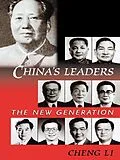Who will govern China at the dawn of the twenty-first century? What are the social backgrounds and career paths of the new generation of leaders? How do they differ from their predecessors in their responses to perplexing economic and sociopolitical challenges? Drawing upon a wealth of both quantitative and qualitative data on the so-called fourth generation of leaders-those who were young during the Cultural Revolution-Cheng Li sheds valuable light on these key questions. He shows that this group is more diversified than previous generations of CCP leaders in formative experiences, political solidarity, ideological conviction, and occupational background. The author explores the contradictions between political leaders and non-elite peers in the same generation-those approaching middle age who were barred from education during the Mao era and now often are unemployed and disenchanted with the government. The book concludes with the intriguing notion that this generation of leaders may have a better understanding of its peers' needs and concerns and therefore may make the regime more accountable to its people, thus contributing to, rather than opposing, democratic development.
Autorentext
Cheng Li is director and a senior fellow at the Brookings Institution's John L. Thornton China Center. He is also a director of the National Committee on U.S.-China Relations. His previous books include Chinese Politics in the Xi Jinping Era: Reassessing Collective Leadership and Bridging Minds Across the Pacific: The Sino-US Educational Exchange. He is the principal editor of the Thornton Center Chinese Thinkers Series published by the Brookings Institution Press.
Inhalt
Chapter 1 Coming of Age: A New Generation of Leaders
Chapter 2 The Rise of Technocrats: Elite Transformation in the Reform Era
Chapter 3 The Fourth Generation of Leaders: A Biographical Analysis
Chapter 4 The "Qinghua Clique": School Networks and Elite Recruitment
Chapter 5 Taizi and Mishu: Informal Networks and Institutional Restraints
Chapter 6 Collective Characteristics: Attitudes and Outlooks of the New Generation of Elites
Chapter 7 Intra-Generational Diversity and Its Implications
